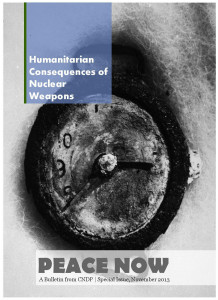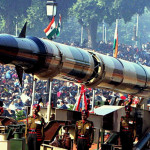
This special issue of PEACE NOW was brought out on the occasion of the National Conference on ‘Abolishing Nuclear Weapons: Relevance for South Asia and the World’ which CNDP co-organized with the International Campaign for Abolishing Nuclear Weapons (ICAN) and the India-Pakistan People’s Forum for Peace and Democracy (PIPFPD).
Sixty eight years after the atomic bombing of Hiroshima and Nagasaki, the world public remains deeply concerned at the scourge of these weapons of mass destruction, their inhuman nature and the menace they continue to pose to the survival of humanity. The end of the Cold War two decades ago undermined the always-dubious rationale of these instruments of mass extermination, but it did not abolish the weapons themselves. The global nuclear arsenal still comprises some 19,000 warheads and thousands of missiles, some of them ready to be launched at short notice, and enough to destroy the planet many times over.
Recent initiatives, including the High-Level Meeting at the United Nations General Assembly, and numerous civil society activities in different parts of the world, have highlighted the imperative of complete and universal nuclear disarmament in keeping with the global public’s collective aspiration for preserving the planet for present and future generations. If chemical and biological weapons can be banned and abolished, so can nuclear armaments with their even greater potential for causing unacceptable harm.
There is a growing realization among citizens that it is necessary to generate public awareness and pressure worldwide in favour of achieving this goal by highlighting the catastrophic humanitarian consequences of nuclear weapons, and hence the profound immorality of their possession and use. The case for banning the use of nuclear weapons through a legal treaty is unassailable.
Yet, the task of bringing about nuclear disarmament cannot be left to the leaders of the nuclear-armed nations alone. They have shown themselves to be more concerned with preserving and refining their nuclear arsenals and perpetuating the discriminatory global order of nuclear haves and have-nots, than with taking serious steps towards nuclear disarmament. Even efforts at promoting nuclear restraint measures, whether globally or regionally, have met with great obstacles in the form of the nuclear weapons-states’ foreign policy and military ambitions.
The principal objective of the Conference was to highlight the urgent need to adopt a global treaty delegitimizing and outlawing nuclear weapons. As many as 151 non-nuclear weapons-states have supported the call for a treaty which bans the use of nuclear weapons. Some nuclear weapons-states also endorse the demand.
Such a treaty would strengthen the moral and political ground for demanding that concrete time-bound steps be taken towards the total and complete elimination of nuclear weapons.

